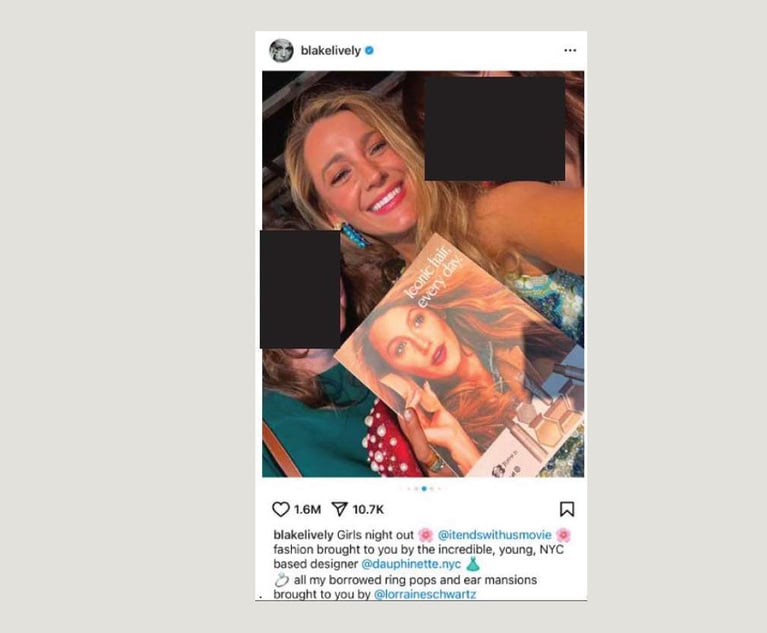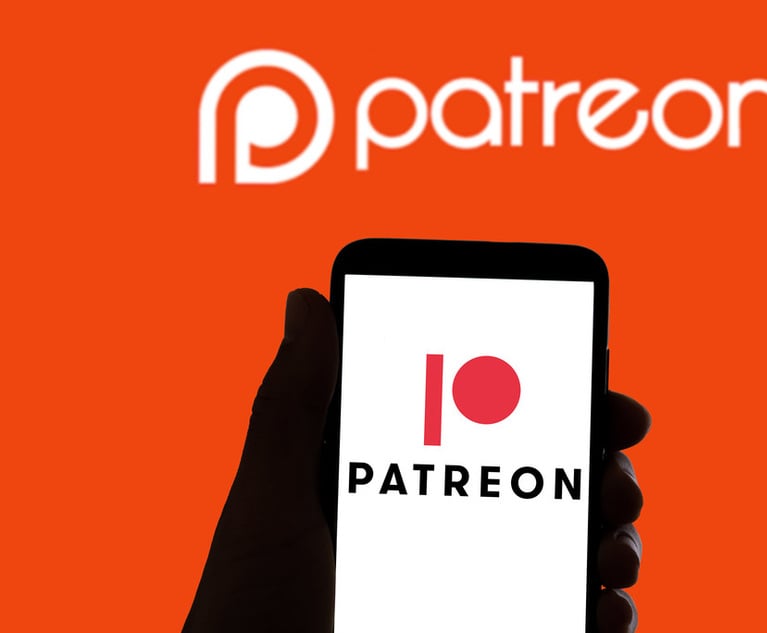Zynga Hit With Class Action Lawsuit Over Data Breach
Tuesday's lawsuit seeks to certify a subclass of young users of the company's social games claiming that the minors aren't bound by contractual terms forced on users upon sign-up.
March 03, 2020 at 05:00 PM
3 minute read
 Zynga headquarters in San Francisco. (Photo: Jason Doiy/ALM)
Zynga headquarters in San Francisco. (Photo: Jason Doiy/ALM)
Social game developer Zynga Inc., the company behind popular mobile games including Words with Friends, has been hit with a class action lawsuit stemming from a data breach that reportedly resulted in hundreds of millions of user accounts being hacked.
Lawyers at Cotchett, Pitre & McCarthy; Foulston Siefkin; and The Miller Law Firm filed suit Tuesday in the U.S. District Court for the Northern District of California on behalf of a nationwide class of Zynga account holders whose personally identifiable information was stolen in the breach disclosed on the company's website in September.
That month a hacker known as Gnosticplayers told cybersecurity news website The Hacker News that he breached Zynga's user database and accessed 218 million user accounts. According to the complaint, the hack encompassed personally identifiable information including user names, email addresses, login IDs, password reset tokens, Facebook IDs, Zynga account IDs and passwords stored with outdated cryptography. The breach affected Zynga users that played games including Words with Friends, Draw Something, and OMGPOP, according to the complaint.
The suit claims that Zynga has so far not alerted users via email, an action plaintiffs claim could trigger users to take precautionary steps to prevent further potential damages from the breach. The suit says the company seems to be "far more concerned with protecting itself than with safeguarding the valuable and confidential information of its users."
A company representative didn't respond to a message seeking comment Wednesday.
The complaint notes that the company opened its September "Player Security Announcement" disclosing the breach by saying: "Cyber attacks are one of the unfortunate realities of doing business today."
Tuesday's lawsuit, brought on behalf of Michigan woman Amy Gitre and a minor from Kansas proceeding under his initials, I.C., seeks to certify subclasses of adult customers and minors. The plaintiffs' lawyers claim that minors are not bound by contractual terms forced upon Zynga users at sign-up. The complaint also claims that Zynga has a substantial number of minor users who are more susceptible to long-term damages stemming from data breaches since they have clean credit histories and tend not to monitor financial activity conducted under their name.
The complaint cites a Carnegie Mellon University study based on identity protection scans of 40,000 U.S. children, which found that the risk of someone using their Social Security number was 51 times higher than that of adults.
"Based on the common use of mobile games among minors, Zynga was well aware of the economic and reputational value of exploiting children for its own monetary gain, and it should have been equally concerned with protecting the PII entrusted to it by that valuable and relatively defenseless group," the complaint says.
This content has been archived. It is available through our partners, LexisNexis® and Bloomberg Law.
To view this content, please continue to their sites.
Not a Lexis Subscriber?
Subscribe Now
Not a Bloomberg Law Subscriber?
Subscribe Now
NOT FOR REPRINT
© 2025 ALM Global, LLC, All Rights Reserved. Request academic re-use from www.copyright.com. All other uses, submit a request to [email protected]. For more information visit Asset & Logo Licensing.
You Might Like
View All
Justin Baldoni Sues Blake Lively and Ryan Reynolds for $400M in New Step in 'It Ends With Us' Fight
6 minute read
Patreon Hit With Lawsuit for Allegedly Diverting Subscriber Data to Meta

Music App Denied Injunction Against Apple Over Alleged Scheme to Block Its Access to App Store

$15K Family Vacation Turned 'Colossal Nightmare': Lawsuit Filed Against Vail Ski Resorts
Law Firms Mentioned
Trending Stories
- 1'A Death Sentence for TikTok'?: Litigators and Experts Weigh Impact of Potential Ban on Creators and Data Privacy
- 2Bribery Case Against Former Lt. Gov. Brian Benjamin Is Dropped
- 3‘Extremely Disturbing’: AI Firms Face Class Action by ‘Taskers’ Exposed to Traumatic Content
- 4State Appeals Court Revives BraunHagey Lawsuit Alleging $4.2M Unlawful Wire to China
- 5Invoking Trump, AG Bonta Reminds Lawyers of Duties to Noncitizens in Plea Dealing
Who Got The Work
J. Brugh Lower of Gibbons has entered an appearance for industrial equipment supplier Devco Corporation in a pending trademark infringement lawsuit. The suit, accusing the defendant of selling knock-off Graco products, was filed Dec. 18 in New Jersey District Court by Rivkin Radler on behalf of Graco Inc. and Graco Minnesota. The case, assigned to U.S. District Judge Zahid N. Quraishi, is 3:24-cv-11294, Graco Inc. et al v. Devco Corporation.
Who Got The Work
Rebecca Maller-Stein and Kent A. Yalowitz of Arnold & Porter Kaye Scholer have entered their appearances for Hanaco Venture Capital and its executives, Lior Prosor and David Frankel, in a pending securities lawsuit. The action, filed on Dec. 24 in New York Southern District Court by Zell, Aron & Co. on behalf of Goldeneye Advisors, accuses the defendants of negligently and fraudulently managing the plaintiff's $1 million investment. The case, assigned to U.S. District Judge Vernon S. Broderick, is 1:24-cv-09918, Goldeneye Advisors, LLC v. Hanaco Venture Capital, Ltd. et al.
Who Got The Work
Attorneys from A&O Shearman has stepped in as defense counsel for Toronto-Dominion Bank and other defendants in a pending securities class action. The suit, filed Dec. 11 in New York Southern District Court by Bleichmar Fonti & Auld, accuses the defendants of concealing the bank's 'pervasive' deficiencies in regards to its compliance with the Bank Secrecy Act and the quality of its anti-money laundering controls. The case, assigned to U.S. District Judge Arun Subramanian, is 1:24-cv-09445, Gonzalez v. The Toronto-Dominion Bank et al.
Who Got The Work
Crown Castle International, a Pennsylvania company providing shared communications infrastructure, has turned to Luke D. Wolf of Gordon Rees Scully Mansukhani to fend off a pending breach-of-contract lawsuit. The court action, filed Nov. 25 in Michigan Eastern District Court by Hooper Hathaway PC on behalf of The Town Residences LLC, accuses Crown Castle of failing to transfer approximately $30,000 in utility payments from T-Mobile in breach of a roof-top lease and assignment agreement. The case, assigned to U.S. District Judge Susan K. Declercq, is 2:24-cv-13131, The Town Residences LLC v. T-Mobile US, Inc. et al.
Who Got The Work
Wilfred P. Coronato and Daniel M. Schwartz of McCarter & English have stepped in as defense counsel to Electrolux Home Products Inc. in a pending product liability lawsuit. The court action, filed Nov. 26 in New York Eastern District Court by Poulos Lopiccolo PC and Nagel Rice LLP on behalf of David Stern, alleges that the defendant's refrigerators’ drawers and shelving repeatedly break and fall apart within months after purchase. The case, assigned to U.S. District Judge Joan M. Azrack, is 2:24-cv-08204, Stern v. Electrolux Home Products, Inc.
Featured Firms
Law Offices of Gary Martin Hays & Associates, P.C.
(470) 294-1674
Law Offices of Mark E. Salomone
(857) 444-6468
Smith & Hassler
(713) 739-1250






